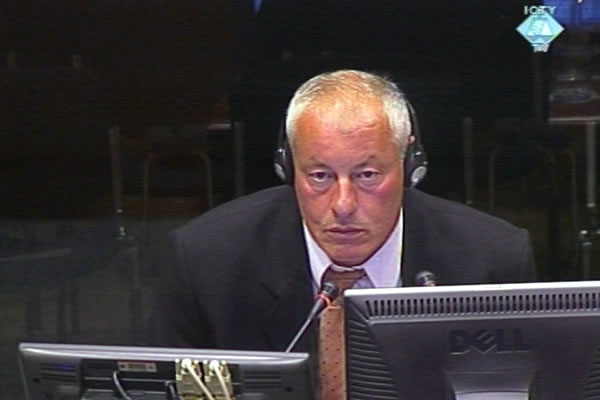Home
MANY WERE CHARGED, BUT THERE WERE NO CONVICTIONS
Noting the efforts of the Croatian authorities to prosecute war crimes after Operation Storm, Gotovina’s defense called Pero Perkovic, a Croatian soldier indicted for murder in the village of Gosici. According to Perkovic, the investigation was defective and the admissions of guilt were made under duress. As a result, the indictment was dropped and nobody has been convicted for the murder of 16 civilians in the villages of Varivode and Gosici
 Pero Perković, svjedok odbrane Ante Gotovine
Pero Perković, svjedok odbrane Ante Gotovine The defense counsel of Croatian generals on trial for crimes during and after Operation Storm in August 1995 are trying to contest the allegation in the indictment that an atmosphere of impunity for crimes committed against civilians was an element of the joint criminal enterprise aimed at expelling Serbs from Krajina. In an effort to prove that the perpetrators were criminally prosecuted, Ante Gotovina’s defence called as its witness a former member of the 15th Home Guard Regiment, Pero Perkovic. Perkovic is one of the Croatian soldiers charged with the murder of Serb civilians in the village of Gosici.
The murder of 16 Serb civilians in the villages of Varivode and Gosici in Krajina is one of few trials before the Croatian courts for war crimes in Operation Storm. It certainly is the biggest. As Perkovic recounted today, it all started with arrest of a group of Croatian soldiers in mid-October 1995. He and his fellow soldiers – Ivica Petric, Nikola Rasic and some others – were among them. They signed their statements, Perkovic contended, because they were physically and mentally abused all the time. They were beaten and told they would be sent to The Hague. They were blamed for ‘Croatia not joining the EU’, Perkovic said.
When the investigative judge visited the scene of crime, it turned out that statements given by the accused didn’t match the crime scene, Perkovic contends. All the accused were acquitted. When a higher court decided to reopen the case, the Sibenik prosecutor Zeljko Zganjer decided to drop it. In his evidence for the prosecution in November 2008 Zganjer gave the same reasons as Perkovic for dropping the indictment: the statements of the soldiers didn’t match the findings at the crime scene and the soldiers claimed that their guilty pleas had been given under duress. They were ‘brutally beaten’ by the police, they claimed.
When a debate started on the views Gotovina’s defense had about the prosecution for the crimes in the villages of Varivode and Gosici, presiding judge Orie intervened, saying the Chamber realized the defense wanted to show that ‘investigations were carried out, even if the contents of guilty pleas were not true’.
When the prosecutor asked the witness in his cross-examination if the Varivode/Gosici case was ever closed, Perkovic said, ‘No, nobody has been convicted yet and the perpetrators are unknown’. When asked if he knew about other crimes that were prosecuted, Perkovic said that as far as he knew there were several cases, and gave five or six examples of trials for isolated incidents in which Serb civilians were wounded or killed. One of the crimes Perkovic mentioned is the murder of an old Serb man in the village of Zrmanja. Perkovic’s fellow fighter Ivica Petric was sentenced to six years for that crime, although he protested his innocence. Petric will have an opportunity to talk about his case in the courtroom in The Hague as he too is on Gotovina’s witness list. The prosecution first planned to call Petric as a witness but then decided not to.
Linked Reports
- Case : Gotovina et al. - "Operation Storm"
- 2009-06-26 GOTOVINA VS. STATE OF CROATIA
- 2009-06-25 AS IMPRESSIVE AS IT GETS
- 2009-06-24 WHAT CONSTITUTES ‘MASS BURNING’
- 2009-07-01 'CRIMINAL AND KILLER' DEFENDING GOTOVINA
- 2009-07-02 CROATIAN JUDICIARY AGAINST THE 'STAMPEDE PHENOMENON'
- 2009-07-03 A THOUSAND QUESTIONS ABOUT A THOUSAND CRIMINAL REPORTS
